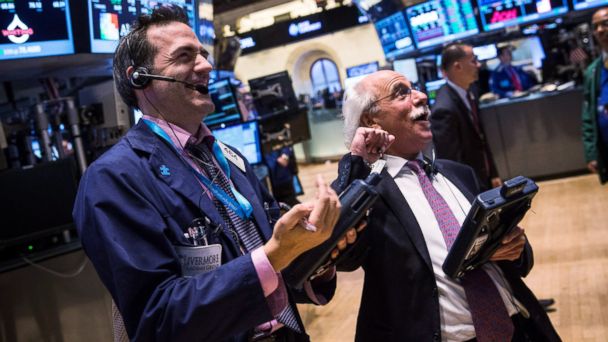Corporate Profits Boost Surging Stocks
Morning Money Memo…

Andrew Burton/Getty Images
The stock market has done it again - breaking records. More than 30 times this year the Dow Jones Index and the S&P 500 have closed at new all-time highs. The Dow rose 111 points Tuesday. Futures rose again this morning. The Nasdaq is closing in on 4,000.
Why is this happening when economic growth is weak? Three reasons: Corporate profits are up as earnings from Google, General Electric and several other big companies were better than expected. Global markets are higher, contributing to the rise on Wall Street. The MSCI All-Country World Index is up nearly 5 percent this month. The Federal Reserve appears to be in no mood to end or taper its stimulus policy of buying long term bonds to keep interest rates low.
Fed policymakers will release a statement today on the economy after their two-day meeting. They may state concern about the negative impact of the recent government shutdown, and the failure of Congress to agree on a budget or an end to the sequester.
The outlook for the global economy is improving. Europe continues to emerge from recession. Japan's industrial economy rose 1.5 percent last month, as stronger production of vehicles and electronic components added to signs the recovery in the world's third-largest economy is gaining traction. Spain's National Statistics Institute says today the nation's economy grew in the 3rd quarter, ending more than two years of recession.
Barnes & Noble is releasing a new version of the Nook e-book reader even as it evaluates the future of tablet computers. The Nook hasn't sold well amid intense competition with Apple's iPad, Amazon's Kindle Fire and others. The company said it isn't giving up on tablets, but it will focus on a new e-reader this year while continuing to sell last year's tablet models.
U.S. home prices have been soaring over the past year, rising more than seven times as fast as the U.S. inflation rate. The latest Case Shiller survey said that the annual home price increase was nearly 13 percent. "This is not going to continue indefinitely," says senior economist David Blitzer of Standard and Poor's. "If we were to sustain 12-13 percent in the annual price of homes you're going to create problems." Blitzer says there's no housing bubble yet because there's an absence of euphoria. Most of biggest annual price rises have been in markets where prices plunged during the recession.
Richard Davies Business Correspondent ABC News Radio abcnews.com Twitter: daviesnow